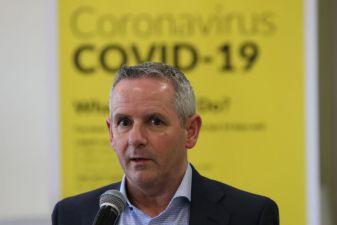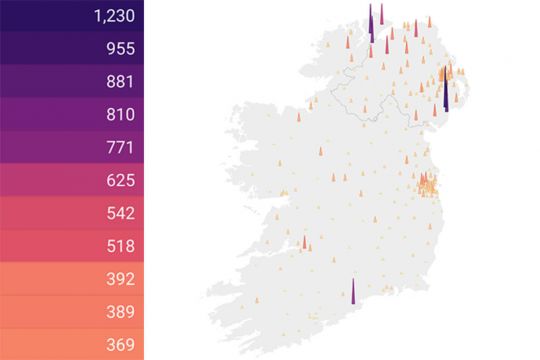Down, Donegal and Derry are Ireland's Covid hotspots, according to the latest official figures.
The BT31 postcode area covering Castlewellan in Co Down continues to have the highest infection rate on the island, with almost 1 in 80 people testing positive over the latest two-week period – 1,230 cases per 100,000 people.
The next worst-affected area is also in Co Down, with the BT33 postcode area, which covers Newcastle, reporting 955 cases per 100,000.
Earlier this week 42 staff at a seafood plant in nearby Kilkeel, Co Down tested positive for Covid.
Mobile testing units moved into the area last month following the identification of the Delta variant of coronavirus, which has since become the dominant strain in the North.
Buncrana, Co Donegal has the worst 14-day infection rate in the Republic, at 881 new cases per 100,000. The average rate in the State is now 121 per 100,000.
An additional walk-in test centre was opened in Buncrana by the HSE earlier this week.
Other areas in Co Donegal with high incidence include Carndonagh (625) and Letterkenny (369).
Neighbouring Derry city is also experiencing a high rate of new Covid infections, with the BT48 postcode recording 810 cases per 100,000.
Dungarvan in Co Waterford has the next highest rate, with 771 cases per 100,000 people.
Other areas where coronavirus is spreading more widely include Ballymoney, Co Antrim (518), Strabane, Co Tyrone (392), Limerick City North (389) and Newry, Co Down (366).
Ongar in west Dublin has the highest infection rate in the capital, with 265 cases per 100,000 people. Balbriggan has the lowest rate in Co Dublin at 52 per 100,000.
Several areas reported fewer than five confirmed Covid cases in the latest 14-day period.
These include Fivemiletown, Co Tyrone, Carrick-on-Suir, Co Tipperary, Ballinamore, Co Leitrim, Belmullet, Co Mayo, Muinebeag, Co Carlow, Bantry, Co Cork, Castleisland, Co Kerry and Granard, Co Longford.
Race against Delta
Concern is mounting over the Delta variant of Covid, with HSE boss Paul Reid saying the spread of the variant is likely to “outmatch” the supply of vaccines over the coming weeks.
Vaccine supplies in the Republic are set to dip in July, in tandem with a rise in Delta cases, which are set to peak in August when they will account for 90 per cent of Covid-19 cases.

Mr Reid urged the public to treat the threat with “real caution”, particularly those who have not yet been vaccinated or who are only partially vaccinated.
He told a press briefing on Thursday that the country was in “a very real race” to get vaccines out ahead of the potential increase in the spread of Delta.
HSE chief clinical officer Dr Colm Henry said that while the vaccination programme has weakened the link between case numbers and hospitalisations, “it isn’t broken”.
“That floodwall is breachable. If there’s enough cases, there’ll be enough vaccine breakthroughs in fully vaccinated people,” he said.







